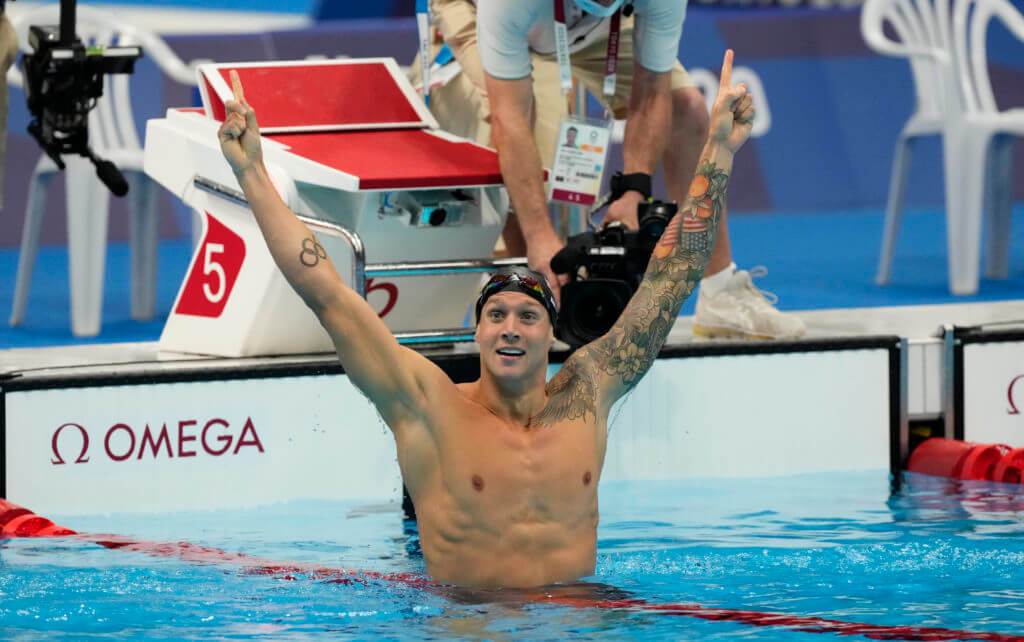Golden Goggles Look: Which Performance Will Win Male Race of the Year?

Golden Goggles Look: Which Performance Will Win Male Race of the Year?
The Golden Goggles Awards are presented annually, across several categories, to swimmers who excelled for the United States during the prior year. This year’s nominees are considered with special emphasis placed on the 2020 Olympic Games in Tokyo. This article focuses on the “Male Race of the Year” category, and reviews which athletes are in contention.
Caeleb Dressel
A five-time Olympic gold medalist at the 2020 Olympics, Dressel has two nominees in this category. The first nomination corresponds to the 100 freestyle. Dressel won and set an Olympic record (47.02) in this event, having touched the wall .06 seconds ahead of Australian Kyle Chalmers. Dressel immediately took the lead, thanks to his typically strong start. He kept that edge and went 22.39 in the first 50 meters. The second half of the race was more challenging, as Chalmers narrowed the gap. However, Dressel’s strong underwaters and last 15 meters without breathing made the difference.
Dressel’s second nomination is in the 100 butterfly. Once again, he led the race from the first 15 meters until the end. Dressel touched at the 50-meter mark with a long turn and was .17 seconds above world-record pace. However, he kept up his solid stroke pace and stayed in front of Hungarian Kristóf Milák. Dressel broke the world record (49.95), with Milák taking second place in a European record (49.68).
Oddly, Dressel was the only American in the finals for both events.
Bobby Finke
Finke is nominated for his incredible performance in the 800 freestyle. Finke became the first man to win this new Olympic event. Even though Finke was not seeded first in the finals, he used a conservative strategy to keep within the top five swimmers throughout the race. Finke was fourth at the 750-meter mark and a body length behind Italian Gregorio Paltrinieri, who was first. Finke’s ability to accelerate his stroke pace and kicking rate in the last 50 meters gave him the gold medal. His last split was 26.39, which is more than two seconds faster than any of his previous 15 laps and half a second faster than any of the other swimmers’ splits.
To put this finish in a better perspective, Finke’s last 50 meters were faster than Olympic champion Tom Dean’s final lap (26.84) of the 200 freestyle. For further perspective, Finke’s speed increased from an average of 1.65 meters per second to 1.79 meters per second.
Finke (7:41.87) made history and shared the historic podium with Paltrinieri (7:42.11) and Ukrainian Romanchuk (7:42.33). Similar to Dressel, Finke was the only American in the final and became the first American to win an Olympic long-distance race since 1984.
Chase Kalisz
Kalisz is nominated for his effort in the 400 individual medley, a swim that landed him gold in Tokyo. Kalisz started the race with a measured tempo in the butterfly and backstroke legs. However, it was his strong breaststroke, a longtime weapon, that moved him into title contention. Kalisz’s breaststroke split was the fastest in the final (1:09.14), and 1.42 seconds faster than Michael Phelps’ breaststroke split (1:10.56) when he broke the world record in Beijing in 2008.
For the last 100, Kalisz maintained his lead and stopped the clock in 4:09.42. His performance kicked off an American haul of 30 medals. More, Kalisz led a 1-2 for Team USA, with his teammate Jay Litherland claiming the silver medal.
So, which race deserves to win at the Golden Goggles. Find out when the annual ceremony takes place in Miami Beach on December 7, 2021.



